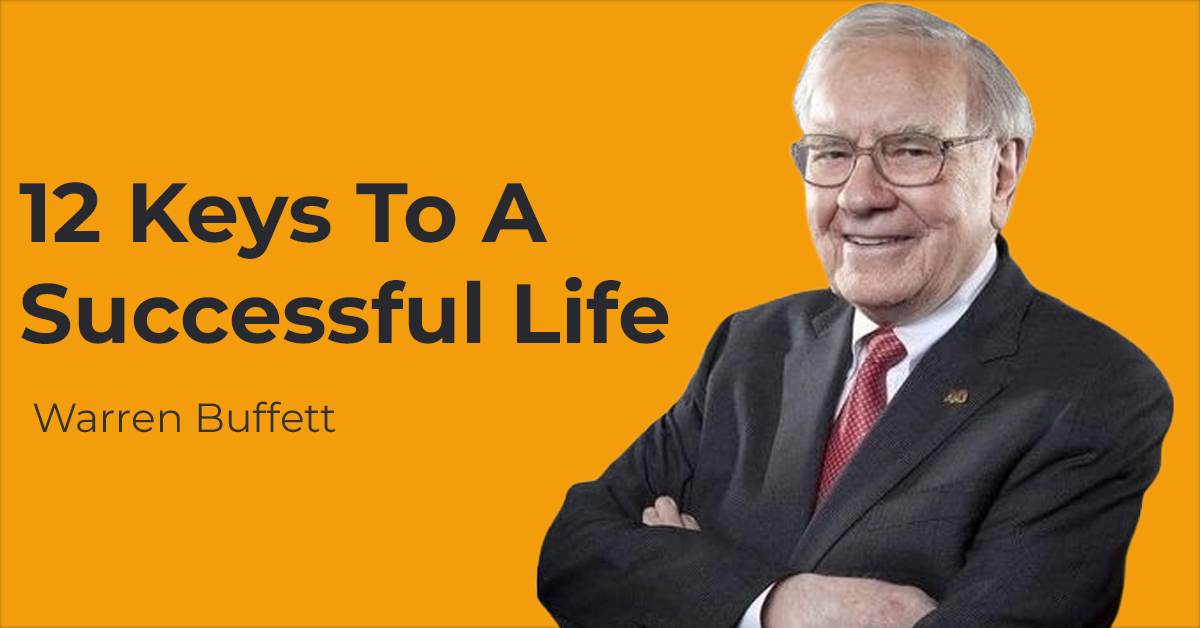Warren Buffett Says True Success in Life Comes Down to Just 12 Key Decisions. Here’s Your Checklist
Warren Buffett is known for two things: making money and giving advice.
In his Berkshire Hathaway letter to shareholders last year, Buffett wrote that his success over 58 years was mainly the result of "about a dozen truly good decisions -- that would be one every five years."
He listed just a few of these decisions, but having written a lot about Buffett (and also having studied all of his shareholder letters), I believe you can use Buffett's well-documented life as a framework to inspire just about anyone to make these kinds of truly good decisions.
So here's a checklist: 12 life decisions that lead to success, using Buffett's example:
1. The decision to nurture curiosity.
Let's start with one that starts early -- early in life, and early on a journey to success. In fact, it's so early that I tend to think of this as something that people might do to help their kids find success, even before they know what the word means.
In Buffett's case, I think we can point to two experiences , both of which happened before he turned 10 years old, that he says sparked real interest. The first was that he borrowed a book called One Thousand Ways to Make $1,000 from the Omaha public library and read it over and over.
The second was that once he started showing interest in finance and the stock market, his father took him on a tour of the New York Stock Exchange.
2. The decision to get started.
Curiosity is great, but the next step has to do with experimentation and execution. Buffett has talked a lot about the first businesses he founded -- things like a paper route, detailing cars, and buying cases of Coca-Cola from his grandfather's grocery store and selling the individual bottles at a markup.
Even at 93 years old, Buffett remembers many of these early ventures in detail -- and he has an unusual advantage. In short, Buffett reports that he has saved a copy of every federal income tax return he ever filed, dating back to 1944.
3. The decision to find mentors.
Nobody does anything worthwhile alone. Most of us mere mortals need mentors to show us the way.
Buffett has talked at length about his first and most important mentor in business: the man he describes as his "investing hero," Benjamin Graham, who died in 1976 at age 82. In fact, one of the reasons Buffett decided to attend Columbia University's business school was that Graham was a professor there.
4. The decision to be bold.
Fortune favors the bold, they say. Actually, the Romans said it. Probably my favorite early Buffett story about boldness has to do with what he decided to do on a January weekend in 1951.
Having learned that Graham, his investing hero and professor, was chairman of Government Employees Insurance Company, or Geico, which was to Buffett at the time "an unknown company in an unfamiliar industry," he decided to take the train to Washington, show up at the company, and ask about it.
Serendipitous result: Lorimer Davidson, who would later become CEO of Geico, gave Buffett a four-hour explanation and tour of the insurance industry. Fast-forward quite a few years, and Buffett's Berkshire Hathaway wound up owning Geico.
5. The decision to be healthy.
"You only get one mind and one body. And it's got to last a lifetime," Buffet famously told his students. "But if you don't take care of that mind and that body, they'll be a wreck 40 years later.... It's what you do right now, today, that determines how your mind and body will operate 10, 20, and 30 years from now."
The irony here is that Buffett has never been known particularly for exercise or healthy habits, and says he has "the diet of a 6-year-old." Actually, there's no way I'd let my 6-year-old consume as much candy, red meat, and can after can of Coca-Cola as Buffett does -- but then again, he has lived to be 93 and counting.
6. The decision to nurture relationships.
One of the decisions Buffett listed in the shareholder letter that sparked this whole exercise was his decision to work with Charlie Munger, who passed away last year but was Buffett's partner for decades.
But Buffett talks about many other crucial partners and relationships as well, among them Thomas Murphy (no relation to me, as far as I know) who was chair and chief executive officer of Capital Cities / ABC Inc., and Chuck Feeney, a billionaire turned intention-former billionaire. (We'll talk more about Feeney below.)
7. The decision to plan for afterward.
Nobody lives forever, and once he began knocking on the door of nonagenarian status, Buffett began to acknowledge this himself -- although he does like to joke about being an exception to the actuarial tables.
Finally, in 2021, he explained the succession plan for Berkshire Hathaway, which will be led by Greg Abel, who is currently the head of all non-insurance businesses at Berkshire Hathaway.
8. The decision to cut your losses.
So many people never learn this lesson, and as someone once put it, they wind up spending their entire lives in the wrong room rather than admit they might have picked an incorrect door.
In Buffett's case, one of the big examples and decisions involved his acknowledgment, after years of trying, that the textile business -- the core of Berkshire Hathaway's business for more than its first 100 years -- was no longer viable in the United States.
9. The decision to laugh.
Life is happier when you laugh more. And while Berkshire Hathaway is a serious business -- what's more serious than money, investments, and people's futures? -- it's striking how often Buffett's letters, speeches, and interviews are peppered with jokes.
He's partial to the corny kind, and also to the bawdy kind that, if you heard your grandfather tell them, would leave you on the fence about whether to laugh or cringe. Here's one from the 2011 shareholder letter that I don't mind quoting:
A good underwriter needs an independent mindset akin to that of the senior citizen who received a call from his wife while driving home.
"Albert, be careful," she warned, "I just heard on the radio that there's a car going the wrong way down the interstate."
"Mabel, they don't know the half of it," replied Albert. "It's not just one car, there are hundreds of them."
10. The decision to teach.
They call Buffett the Oracle of Omaha, and he clearly loves the role. In fact, there are so many moments in his letters and other communications in which he makes asides to offer advice or hard-learned lessons that teaching truly seems to be his second calling.
One of my favorite examples here is the advice he gave verbatim twice over the years, in both the 1987 and 2003 shareholder letters. (Maybe he thought the audiences had turned over sufficiently in the interim?)
Anyway, it's this, and it really goes back to the first item on the list: "Develop your eccentricities when young."
11. The decision to do nothing.
This one is important: Besides the limited number of very good decisions Buffett says he's made, the other key to success is simply not to do anything when you don't see any good option. Instead of the old adage, "Don't just stand there, do something," Buffett suggests the opposite: Don't just do something, stand there!
Actually, let's use his precise quote: "The trick is, when there is nothing to do, do nothing."
12. The decision to give back.
This is where we get back to Chuck Feeney, who I mentioned all the way back in item No. 6 on this list. Feeney was a multi-billionaire who made it his life goal to give away all of his money.
It was Feeney's example that inspired Buffett to team up with Bill Gates to launch the Giving Pledge, and get more than 200 other billionaires to sign it as well.
More than his wealth, more than his advice, more than his 12 decisions -- many years from now, these are the kinds of things for which Buffett will be best remembered.
The opinions expressed here by Inc.com columnists are their own, not those of Inc.com.
Credits: inc.com







When someone writes an post he/she keeps the idea of a user in his/her mind that how a
user can know it. Therefore that’s why this post is great.